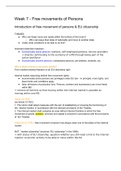Summary
EU law Summary (week 7-12) - for final Exam (incl. Recap for exam)
- Course
- Institution
The second part of EU law is summarised, containing reading material and lecture notes (merged). At the end of the summary, there is a recap with several steps that help to analyse exam questions. The topics covered are: 1. Free movements of Persons I, 2. Free movements of Persons II, 3. Competi...
[Show more]



